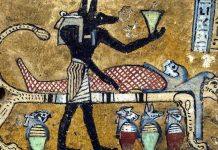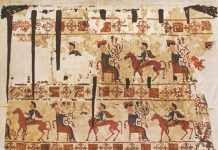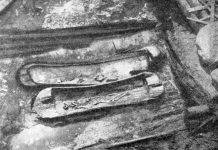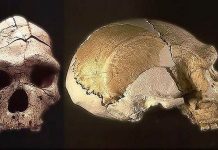Baalbeck is a city in eastern Lebanon famous chiefly for its magnificent, excellently preserved Roman temple ruins. It was a flourishing Phoenician town when
the Greeks occupied it in 331 B.C. They renamed it “Heliopolis” (City of the Sun) .
It became a Roman colony under the Emperor Augustus in 16 B.C..On its acropolis, over the course of the next three centuries, the Romans constructed a monumental ensemble of three temples, three coutyards, and an enclosing wall built of some of the most gigantic stones ever crafted by man. Some tourists believe that the construction can only be attributed to extra-terrestial artwork .
At the southern entrance of Baalbeck is a quarry where the stones used in the temples were cut. A huge block, considered the largest hewn stone in the world, still sits where it was cut almost 2,000 years ago. Called the “Stone of the Pregnant Woman”, it is 21.5m x 4.8m x 4.2meters in size and weighs an estimated 1,000 tons.
The Temples In History
For centuries the temples of Baalbeck lay under meters of rubble, obscured by medieval fortifications. But even in ruin the site attracted the admiration of visitors and its historical importance was recognized.
The first survey and restoration work at Baalbeck was begun by the German Archaeological Mission in 1898. In 1922 French scholars undertook extensive research and restoration of the temples, work which was continued by the Lebanese Directorate General of Antiquities.
Baalbeck’s temples were built on an ancient tell that goes back at least to the end of the third millennium B.C. Little is known about the site during this period, but there is evidence that in the course of the 1rst millennium B.C. an enclosed court was built on the ancient tell. An altar was set in the center of this court in the tradition of the biblical Semitic high places.
During the Hellenistic period (333-64 B.C.) the Greeks identified the god of Baalbeck with the sun god and the city was called Heliopolis or City of the Sun. At this time the ancient enclosed court was enlarged and a podium was erected on its western side to support a temple of classical form. Although the temple was never built, some huge construction from the Hellenistic project can still be seen. And it was over the ancient court that the Romans placed the present Great Court of the Temple of Jupiter.
The temple was begun in the last quarter of the 1rst century B.C., and was nearing completion in the final years of Nero’s reign (37-68 A.D.). the Great Court Complex of the temple of Jupiter, with its porticoes, exedrae, altars and basins, was built in the 2nd century A.D. Construction of the so-called temple of Bacchus was also started about this time.
The Propylaea and the Hexagonal Court of the Jupiter temple were added in the 3rd century under the Severan Dynasty (193-235 A.D.) and work was presumably completed in the mid-3rd century. The small circular structure known as the Temple of Venus, was probably finished at this time as well.
When Christianity was declared an official religion of the Roman Empire in 313 A.D., Byzantine Emperor Constantine officially closed the Baalbeck temples. At the end of the 4th century, the Emperor Theodosius tore down the altars of Jupiter’s Great Court and built a basilica using the temple’s stones and architectural elements. The remnants of the three apses of this basilica, originally oriented to the west, can still be seen in the upper part of the stairway of the Temple of Jupiter.
After the Arab conquest in 636 the temples were transformed into a fortress, or qal’a, a term still applied to the Acropolis today.
During the next centuries Baalbeck fell successively to the Omayyad, Abbasid, Toulounid, Fatimid and Ayyoubid dynasties. Sacked by the Mongols about 1260, Baalbeck later enjoyed a period of calm and prosperity under Mamluke rule.
The temple complex of Baalbeck is made up of the Jupiter Temple and the Bacchus Temple adjacent to it. A short distance away is the circular structure known as the Temple of Venus. Only part of the staircase remains of a fourth temple dedicated to Mercury, on Kheikh Abdallah hill.
Temple of Jupiter
The first view the visitor has of Baalbeck is the six Corinthian columns of the Great Temple (or “Jupiter Temple”) thrusting 22 meters into the skyline. Built on a podium seven meters above the Court, these six columns and the entablature on top give an idea of the vast scale of the original structure.
The complex of the Great Temple has four sections: the monumental entrance or Propylaea, the Hexagonal Court, the Great Court and finally the Temple itself, where the six famous columns stand.
The Temple of Jupiter is one of the most impressive Temples in Baalbeck.
It measures 88×48 meters and stands on a podium 13 meters above the surrounding terrain and 7 meters above the courtyard. It is reached by a monumental stairway.
Originally surrounded by 54 external columns, most of these now lie in fragments on the ground. The six standing columns are joined by an entablature decorated with a frieze of bulls and lions’ heads connected by garlands.
The Podium is built with some of the largest stone blocks ever hewn. On the west side of the podium is the “Trilithon”, a celebrated group of three enormous stones weighing about 800 tons each.
It was decided to furnish the temple with a monumental extension of the podium which, according to Phoenician tradition, had to consist of no more than three layers of stone. The fact remains that this decision initiated the cutting, transporting and lifting of the largest and heaviest stones of all times. Not only had a wall of 13 meters in height to be composed of three ranges of stones, but in the interest of appearance the middle blocks were made of a length four times their height. Adding to this a depth equal to the height of the stones, they had to be of a volume of up to 400 cubic meters per block, corresponding to a weight of almost 1000 tons. Technically, the builders of Baalbeck proved that they could do it, since three such blocks of the middle layer are in place, but in terms of time they did not succeed – the podium remained incomplete. Nevertheless, so awe-inspiring were those blocks to all beholders ever after, that Baalbeck was known for a long time primarily as the site of the three stones, the trilithon.








































